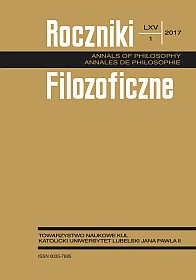A trial of interpretation of Meister Eckhart’s thought on God and man through the analysis of its paradoxes
Abstract
This article interprets Eckhart’s contradictions by presenting them as a result of an existential search for salvific power. It is shown that power is ambivalent in nature: it is the power of what is and the power of (self)overcoming (of what is). Just because power is in itself ambivalent and the process of searching for it existentialist (so not completely conscious), Eckhart’s mystical texts are full of contradictions and the German mystic is apparently not aware of it. The sample of them is shown in this article with regard to his ideas on God and man. Three other interpretations of Eckhart’s (“apophatic,” “educational,” “methodological”) are presented and argued against.
References
Bernhart, Joseph. Die philosophische Mystik des Mittelalters von ihren antiken Ursprüngen bis zur Renaissance. München: Ernst Reinhardt, 1922.
Beyer de Ryke, Benoît. Maître Eckhart. Avec choix de textes. Paris: Éditions Entrelacs, 2004.
Blans, Bert. Cloud of Unknowing. An Orientation in Negative Theology from Dionysius the Areopagite, Eckhart and John of the Cross to Modernity. In Flight of the Gods. Philosophical Perspectives on Negative Theology, edited by Ilse Nina Bulhof and Laurens ten Kate. New York: Fordham University Press, 2000.
Congregatio pro Doctrina Fidei. Letter to the Bishops of the Catholic Church on Some Aspects of Christian Meditation. Boston, MA: Pauline Books & Media, 1989.
Copleston, Frederick C. History of Philosophy. Late Medieval and Renaissance. New York, London: Doubleday, 1993
Davies, Oliver. Introduction to Meister Eckhart, Selected writings. Selected and translated by Oliver Davies. London: Penguin Classics, 1994.
Eliade, Mircea. Yoga: Immortality and Freedom. Translated by Willard R. Trask. Princeton: Princeton University Press, 1969.
Haldane, John. Faithful Reason: Essays Catholic and Philosophical, London: Routledge, 2004.
Kaźmierczak, Zbigniew. Friedrich Nietzsche jako odnowiciel umysłowości pierwotnej. Analiza w kontekście fenomenologii Gerardusa van der Leeuwa. Kraków: Towarzystwo Autorów i Wydawców Prac Naukowych “Universitas,” 2000.
Kaźmierczak, Zbigniew. Paradoks i zbawienie. Antropologia filozoficzna Mistrza Eckharta i Jana od Krzyża. Białystok: Trans humana, 2009.
Kelly, C[arl] F[ranklin]. Meister Eckhart on Divine Knowledge. New Haven, London: Yale University Press, 1977,
McGinn, Bernard. The Mystical Thought of Meister Eckhart: The Man from Whom God Hid Nothing. New York: Crossroad Publishing/Herder & Herder, 2003.
[Meister Eckhart]. The Complete Mystical Works of Meister Eckhart. Translated by Maurice O’Connel Walshe. New York: The Crossroad Publishing Company, 2009.
Meister Eckhart. Prologi in Opus tripartitum; Expositio in Libri Genesis und Libri Parabolarum Genesis, edited by Konrad Weiss and Loris Sturlese. Die lateinischen Werke, Bd. l. Stuttgart: Kohlhammer, 1964.
Meister Eckhart. Sermones, edited by Ernst Benz, Bruno Decker, and Joseph Koch. Die lateinischen Werke, Bd. 4. Stuttgart: Kohlhammer, 1956.
Meister Eckhart. Collatio in Libros Sententiarum; Quaestiones Parisiensis; Sermo die b. Augustini Parisius habitus; Tractatus super Oratione Dominica; Fragmenta; Acta et regesta vitam magistri Echardi illustrantia; Processus contra magistrum Echardum, edited by Joseph Koch, Bernhard Geyer, and Erich Seeberg. Die lateinischen Werke, Bd. 5. Stuttgart: Kohlhammer, 1936.
Nietzsche, Friedrich. Daybreak: Thoughts on the prejudices of morality. Translated by Reginald J. Hollingdale. Cambridge: Cambridge University Press, 1997.
Friedrich Nietzsches Briefwechsel mit Franz Overbeck, edited by Richard Oehler and Carl Albrecht Bernoulli. Leipzig: Insel Verlag, 1916.
Piórczyński, Józef. Mistrz Eckhart. Mistyka jako filozofia, Wrocław: Fundacja na Rzecz Nauki Polskiej “Leopoldinum,” 1997.
Quint, Josef. “Mystik und Sprache. Ihr Verhältnis in der spekulativen Mystik Meister Eckharts.” Deutsche Vierteljahreszeitschrift für Literaturwissenschaft und Geistesgeschichte 27 (1953): 48–75.
Reiter, Peter. Der Seele Grund. Meister Eckhart und die Tradition der Seelenlehre. Würzburg: Königshausen and Neumann, 1993.
Schürmann, Reiner. Introduction to Wandering Joy. Meister Eckhart’s Mystical Philosophy. Translation and commentary by Reiner Schürmann. Introduction by David Appelbaum. Great Barrington, Mass.: Lindisfarne Books, 2001.
Turner, Denys. The Darkness of God. Negativity in Christian mysticism. Cambridge: Cambridge University Press, 1995.
Copyright (c) 2017 Roczniki Filozoficzne

This work is licensed under a Creative Commons Attribution-NonCommercial-NoDerivatives 4.0 International License.





